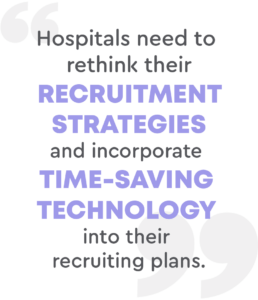Why is Healthcare Recruitment Important?
 Recruitment of new employees is vital for any business hoping to grow and succeed in its industry. However, healthcare faces unique challenges (a shrinking candidate pool, high turnover, and increasing demand for top-notch healthcare professionals) that make recruitment difficult. To be competitive, hospitals need to rethink their recruitment strategies and incorporate time-saving technology into their recruiting plans.
Recruitment of new employees is vital for any business hoping to grow and succeed in its industry. However, healthcare faces unique challenges (a shrinking candidate pool, high turnover, and increasing demand for top-notch healthcare professionals) that make recruitment difficult. To be competitive, hospitals need to rethink their recruitment strategies and incorporate time-saving technology into their recruiting plans.
Modernizing your talent acquisition strategy is necessary for the success of your healthcare institution. Recruitment technologies save time and money, enabling you to focus on your top candidates and reach them faster than your competitors. We’ve put together a list of the top three ways your recruitment strategy affects the success of your healthcare organization, along with ways you can improve and modernize your hiring process.
1. Demand is greater than supply, causing competition to heat up among healthcare institutions.
Healthcare is booming, with year-over-year job growth at over 54 percent. At the same time, the number of professionals in the field is shrinking. In 2020, the number of nurses leaving the industry rose to 80,000, up from 40,000 in 2010. The Association of American Medical Colleges predicts a deficit of 139,000 physicians over the next two decades. As a result, healthcare facilities offering similar opportunities and services will be stuck in a war for talent in the coming years, with hospitals racing to sign their top-choice candidates.
When you combine the candidate shortage with the hectic lives of healthcare professionals, you have the perfect storm. interviewstream simultaneously speeds up hiring times and simplifies the process for HR and recruiters so you can reach the best candidates first. Looking for proof? Try out our interview scheduler— a scheduling solution that eliminates the back-and-forth emails and phone calls with candidates, saving you and your potential new hire precious time.
2. Job vacancies affect the welfare of your patients – and your brand.
Delays in filling vacant hospital positions have consequences that impact patients’ comfort and wellbeing, as well as affecting employees left to pick up the slack. Long wait times, surgical delays, and unanswered patient calls—all contribute to a chaotic atmosphere that lowers patient satisfaction scores and the facility’s reputation. As precious staff members burn out under stress, they leave the hospital with yet another job vacancy.
The solution to this vicious cycle lies in having access to a steady stream of new healthcare recruits and a recruitment system that cuts down on time to hire. Hospitals need to show that they care about their employees, and that starts with the interview process. With our on demand interview platform, candidates can answer first-round interview questions on their own time, allowing you to reach passive candidates who are currently working with other organizations. Better yet, recruiters can watch and rewatch these videos—they love having the ability to pause, take notes, share, and compare candidate interviews.
3. High turnover rates waste resources.
Of the 155,000 registered nurses who join the profession each year, up to half of them leave their roles within two years. Nurses cite lack of leadership, high patient-to-nurse ratios, and physical demands. Healthcare Finance News reports the average cost of a lost healthcare employee is $60K. A loss like that can add up quickly. Worse yet, specialist vacancies can result in millions of dollars of lost revenue.
Structured residency programs can help cut turnover rates in half, but the other half of the issue stems from recruitment inefficiency. Factors associated with job retention include:
-
- Personal characteristics (motivation, attitude, and educational background)
- Work attitudes (job satisfaction, autonomy, and commitment)
- Work attributes (shift, job title)
- Poor onboarding or hiring process
Your interview and onboarding process is crucial to find employees that will stick around. Finding the top candidates and retaining them is difficult, but you can start by letting your potential employees feel in control of the job-seeking process. Taking steps to simplify their interview process, and showing you care before you even onboard, builds the foundation for a healthy work relationship.
How to improve healthcare recruitment in 2021
Prospective candidates expect employers to use the latest technology in recruitment and want flexibility in scheduling interviews. This isn’t the 80’s—candidates don’t want to sit outside your office, resumes in hand, waiting for you to call them in for an interview. They want the freedom to complete interviews when and where is easiest for them. Healthcare is one of the primary industries we serve at interviewstream, so let us help you cut down hiring costs and time to hire.
We transform the hiring experience into a simple process that achieves real-world results. Contact us for a demo and see how we can simplify your healthcare recruitment strategy, all while lowering costs and enabling you to snag the best candidates.
About The Author
Caroline Chessia is the Marketing Operations Specialist at interviewstream. She loves color-coordinated graphs, hiking in the mountains, and every dog she meets—especially the Golden Retrievers.
